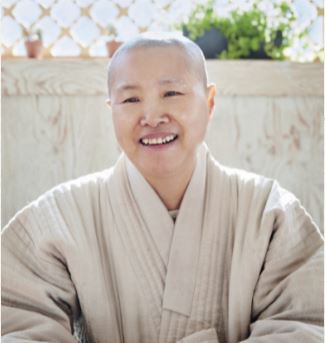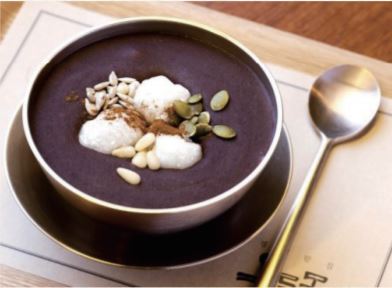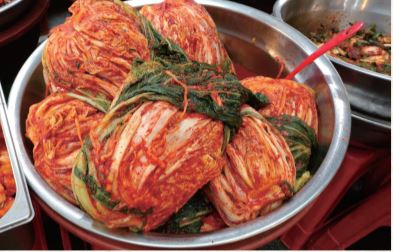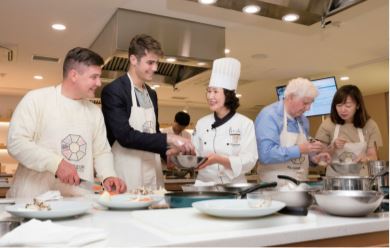
There would be many Kingos who are taking a breath after the mid-term exam in May. What foods did Kingos eat during the busy examination period? Most students might have eaten foods that are convenient and fast to eat rather than eating healthy foods. For those Kingos, Korean temple cuisine can refresh their stressed bodies and minds. Therefore, the Sungkyun Times (SKT) met Ven. Sunjae, the chairperson of the Korean Food Promotion Institute (KFPI) to introduce the dietary culture of Korea, which is one of the most important parts of Korean culture.
Retracing the Life of Ven. Sunjae
Q1. Please introduce yourself to the Kingos.
Hello, my name is Mayul Sunjae. Mayul is my pen name, which means “to become the basis”. I am also working as the chairperson of the KFPI.
Q2. What prompted you to become a Buddhist nun?
Actually, I was not a Buddhist from the beginning, even though I was brought up in a Buddhist household. Having a strict upbringing, I wanted to get away from the old customs. At first, I wanted to become a nurse or a stenographer and go abroad. Then one day, I got a chance to attend a monk’s lecture about parents’ love. The lecture explained the deep love of our parents’, which impressed me a lot. According to the lecture, there are three filial piety virtues of respecting parents. The lowest one is material aid, which is completed by just offering good food and clothes to one’s parents. The middle one is whole-souled devotion to parents. The highest one is to throw away all one’s obsessions. After the lecture, I was enlightened and decided to convert to Buddhism, in order to serve my parents with devotion.
Q3. What prompted you to have an interest in Korean temple cuisine?
After converting to Buddhism, I found that I loved studying it so much that I felt sorry for starting so late. Consequently, I introduced the teachings of Buddhism to many children. Since I believe that Buddhist cuisine contributes to not only the healthy body but also the healthy mind, I had Buddhist cuisine with the students I taught. As a result, many troublemakers became model students. Therefore, I began to write a paper about the relationship between Buddhist eating culture and the mental health of people. Afterward, I taught so many students, which led to a lack of time to rest. One day, I was diagnosed with cirrhosis and given one year to live. I started to follow the teachings of Buddhism and ate Buddhist cuisine every day. After a year, the antibodies against the germs were formed in my body.
Q4. You are the first master of Korean temple cuisine in Korea. What do you think is the key point in Korean temple cuisine?
Food is medicine and it forms one’s life. Cooking skills are not the most important element in Buddhist cuisine. We need a healthy body and pure spirit to be healthy and happy. These can be earned through natural foods. If the soil is polluted, then the plants living in the soil can also become polluted. After all the processes, the human who eats them gets sick. Eventually, nature and humans become connected to each other, and Buddhist cuisine has all of the energy of nature. This connection is the most important thing in Buddhist cuisine.

Ven. Sunjae’s Love Towards Korean Food
Q5. What kind of work do you do as the current chairperson of KFPI?
Korean cuisine has a history of five thousand years. Also, Korea has four distinct seasons. One ingredient has diverse tastes and recipes, which vary season to season. For example, do you know why our ancestors ate patjuk (red-bean gruel) at dongji? Many people think that it is because red beans drive away devils, but there is more than that. Ipdong is the onset of winter and dongji is winter solstice, meaning the start of the coldest period of winter. When it gets cold, people easily catch a cold and even pneumonia if it gets worse. The red bean removes the chill from the human body. Likewise, every single Korean cuisine has ancestors’ wisdom. Therefore, the KFPI works to restore this wisdom and tells them to people. Also, we discover, study, reproduce, and preserve the wisdom, not only for the present generation, but also for the future. All of those works are for the Koreans’ healthy lives. Moreover, we have to know the history of Korean food accurately before the globalization of Korean cuisine.
Q6. What is your own definition of Korean food?
Korean food is Korean culture and history. We are composed of what we eat. The advantages of Korean food are fermentation and the variety of food ingredients. When foreigners come to Korea, they can eat diverse food every day. I wish Koreans ate healthy traditional food rather eating than junk food or instant food.
Q7. Recently, many modern people are eating more Western food and Instant food than Korean food and natural food. What do you think about this situation?
When I was very sick, the thing that saved me was kimchi (Korean fermented vegetable), not medicine or detox juice. I always say “do not say that you are too busy to eat healthy food.” Even if you eat just a bowl of rice and kimchi every morning, you will be energetic. Nowadays, many people suffer from diseases of both body and mind such as diabetes, obesity, and depression. Also, air pollution is one of the most serious problems in Korea because of the fine dust. I think that Korean food, especially fermented food, can help to solve the problem.

Q8. Many people still have an idea that Korean cuisines are difficult to make. What do you think about this view?
They think that because people do not know much about Korean cuisine. We need to have time for ourselves at least once a week. At that time for you, why don’t you cook nice Korean cuisine? Just cut vegetables such as potatoes and young pumpkins, pour water on them, put a scoop of doenjang (the soybean paste), and boil it. Through these simple steps, you can cook doenjang soup. It is not only easy to make but also good for your health. The only problem is that most people do not even try because they do not know how to make it accurately.
For the Globalization of Korean Food
Q9. What do you think is the most important thing for the globalization of Korean food?
The most important thing is to make the story. Tteok (rice cake), is one of the examples. Koreans eat tteok both at happy feasts like marriage and at sorrowful moments like funerals. The scattered grains of rice become a lump of tteok, which is similar to the Korean people; each Korean gathers together in joy and in sorrow, like the tteok. Likewise, by making a story, the world’s interest in Korean foods will increase, which will lead to the globalization of Korean cuisine.

Q10. What do you think is the biggest barrier for foreigners’ trying Korean food?
Some foreigners have trouble eating spicy food, green onion, garlic, and salted seafood. When they try Korean foods, the Buddhist cuisine, however, is traditional cuisine that does not have those ingredients. This is the reason that many foreigners love Buddhist cuisine regardless of their religion.
Q11. What do you think about the directions that Korean restaurants should take?
They should make genuine food and keep their pride, which means that the owner of the restaurant should cook and serve the guests by oneself. For example, in Japan, the owner of a restaurant cooks and carries food themselves, and the family passes on the food and restaurants. On the contrary, in Korea, however, the owners pass-on only restaurant buildings, not the food served at the restaurants.
Q12. Lastly, do you have any last words to Kingos?
Sungkyunkwan University (SKKU) is the school that preserves Korean traditions. I want Kingos to ask themselves how much they know and understand about Korean traditions, and if they eat fresh and healthy food. I think that people should learn about the traditions of Korean food since they are students. I would like Kingos to know more about our traditions and culture.
